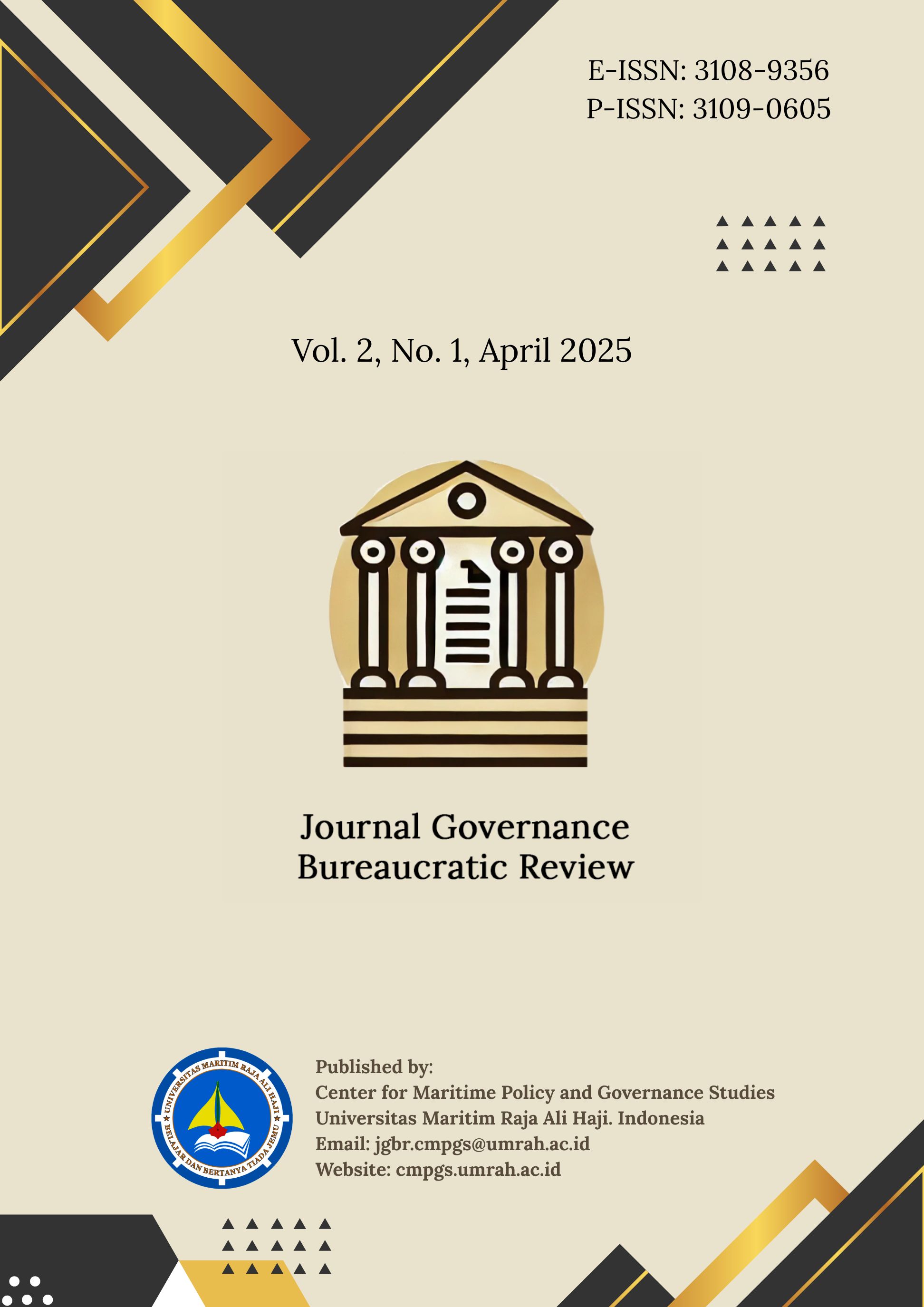Direct Regional Head Elections and Excessive Corruption Loopholes
DOI:
https://doi.org/10.31629/jgbr.v2i1.7430Keywords:
Decentralization, Corruption, Regional Autonomy, Direct Regional ElectionsAbstract
Corruption remains one of the most pressing challenges undermining democracy, governance, and public trust in Indonesia, particularly following the implementation of decentralization and regional autonomy. While regional autonomy was intended to bring prosperity and equal development, in practice it has often facilitated the spread of corrupt practices from central government to regional administrations. The issue has become more acute with the implementation of direct regional head elections (pilkada), which, though designed to strengthen democratic participation, have created significant financial and political pressures on candidates, often resulting in the misuse of state budgets and the normalization of money politics. This study aims to examine the relationship between direct regional elections and the proliferation of corruption loopholes, highlighting how electoral mechanisms inadvertently encourage corrupt behavior. The research employs a descriptive explorative method, relying on secondary data from scholarly works, official documents, and prior research, and analyzing them through qualitative descriptive analysis to uncover patterns and systemic weaknesses. The findings indicate that direct elections, while enhancing political legitimacy, also generate high financial demands that compel candidates to seek external funding, leading to post-election corruption through budget manipulation, project markups, politicization of social assistance, and collusion between bureaucrats, legislatures, and political investors. Moreover, the system often fails to ensure accountability, as legislative oversight is weak and public mechanisms for monitoring leaders remain limited. The study concludes that although direct elections provide opportunities for citizen participation, they also institutionalize structural vulnerabilities that sustain corruption. This paradox underscores the need for reforms in electoral financing, stricter accountability mechanisms, and stronger institutional checks and balances to prevent democracy from becoming a breeding ground for corruption.
Downloads
References
Abdullah, J. (2015). Tugas dan wewenang lembaga-lembaga penanganan tindak pidana korupsi di indonesia. Yudisia: Jurnal Pemikiran Hukum Dan Hukum Islam, 5(1), 102–122.
Atnan, N. (2014). Fenomena Korupsi Pejabat Publik di Jawa Barat: The Phenomenon of Corruption of Public Officials in West Java. JKMP (Jurnal Kebijakan Dan Manajemen Publik), 2(2), 131–146. https://doi.org/10.21070/JKMP.V2I2.434
Azmi, L. (2023). Implementasi Pendidikan Politik Bagi Warga Negara Dalam Meningkatkan Kesadaran Politik. Jurnal Media Ilmu, 2(2), 173–186. https://doi.org/10.31869/JMI.V2I2.4916
Drury, A. C., Krieckhaus, J., & Lusztig, M. (2006). Corruption, democracy, and economic growth. International Political Science Review, 27(2), 121–136. https://doi.org/10.1177/0192512106061423
Everett, J., Neu, D., & Rahaman, A. S. (2007). Accounting and the global fight against corruption. Accounting, Organizations and Society, 32(6), 513–542. https://doi.org/10.1016/j.aos.2006.07.002
Fatkhuri, F. (2017). Korupsi dalam Birokrasi dan Strategi Pencegahannya. Jurnal Ilmiah Manajemen Publik Dan Kebijakan Sosial, 1(2), 65–76. https://doi.org/10.25139/JMNEGARA.V1I2.784
Fazzan, F. (2015). Korupsi di Indonesia dalam perspektif hukum pidana Islam. Jurnal Ilmiah Islam Futura, 14(2), 146–165. https://doi.org/10.22373/JIIF.V14I2.327
Gans-Morse, J., Borges, M., Makarin, A., Mannah-Blankson, T., Nickow, A., & Zhang, D. (2018). Reducing bureaucratic corruption: Interdisciplinary perspectives on what works. World Development, 105, 171–188. https://doi.org/10.1016/j.worlddev.2017.12.015
Habaora, F., Riwukore, J. R., Manafe, H., Susanto, Y., & Yustini, T. (2020). Strategi Pencegahan dan Pemberantasan Korupsi di Pemerintah Kota Kupang, Provinsi Nusa Tenggara Timur, Indonesia. Aspirasi: Jurnal Masalah-Masalah Sosial, 11(2), 229–242. https://doi.org/10.46807/ASPIRASI.V11I2.1556
Hariyani, H. F., Priyarsono, D. S., & Asmara, A. (2016). Analisis faktor-faktor yang memengaruhi korupsi di kawasan Asia Pasifik. Jurnal Ekonomi Dan Kebijakan Pembangunan, 5(2), 32–44. https://doi.org/10.29244/jekp.5.2.2016.32-44
Lestari, R. A. (2019). Reformasi Birokrasi sebagai Pelayan Publik. Dinamika Governance: Jurnal Ilmu Administrasi Negara, 9(1). https://doi.org/10.33005/JDG.V9I1.1421
Muallifin, M. D. A. (2015). Problematika dan Pemberantasan Korupsi di Indonesia. AHKAM, 3(2), 311–325.
Muchlis, A. (2016). Penegakan Hukum Terhadap Tindak Pidana Korupsi Dengan Kerugian Negara Yang Kecil Dalam Mewujudkan Keadilan. Fiat Justisia: Jurnal Ilmu Hukum, 10(2), 221–412. https://doi.org/10.25041/FIATJUSTISIA.V10NO2.652
Rachman, F. (2018). Upaya Penanggulangan Tindak Pidana Korupsi di Indonesia. Keadilan Progresif, 9(2), 113–124. https://jurnal.ubl.ac.id/index.php/KP/article/view/1065
Ridwan, R. (2012). Peran Lembaga Pendidikan dalam Pemberantasan Tindak Pidana Korupsi di Indonesia. Jurnal Dinamika Hukum, 12(3), 547–556. https://doi.org/10.20884/1.JDH.2012.12.3.126
Rumambi, D. Ch. (2014). Korupsi Dalam Perspektif Hukum Administrasi Negara. LEX ET SOCIETATIS, 2(7), 106–114. https://doi.org/10.35796/LES.V2I7.5396
Saifuddin, B. (2017). Dampak dan upaya pemberantasan tindak pidana korupsi di indonesia. Warta Dharmawangsa, 1(52), 1–15. https://doi.org/10.46576/WDW.V0I52.259
Setiadi, W. (2018). Korupsi di Indonesia; Penyebab, Bahaya, Hambatan dan Upaya Pemberantasan, Serta Regulasi. Jurnal Legilasi Indonesia, 15(3), 249–262.
Soemanto, S., Sudarto, S., & Sudarsana, S. (2014). Pemahaman Masyarakat Tentang Korupsi. Yustisia, 3(1), 80–88. https://doi.org/10.20961/YUSTISIA.V3I1.10124
Sosiawan, U. M. (2019). Peran Komisi Pemberantasan Korupsi (KPK) Dalam Pencegahan dan Pemberantasan Korupsi. Jurnal Penelitian Hukum De Jure, 19(4), 517. https://doi.org/10.30641/dejure.2019.v19.517-538
Sugiarto, T. (2013). Peranan komisi pemberantasan korupsi (KPK) dalam pemberantasan tindak pidana korupsi di Indonesia. 18(Juni), 188–196.
Waluyo, B. (2014). Optimalisasi pemberantasan korupsi di indonesia. Jurnal Yuridis, 1(2), 169–162. https://doi.org/10.35586/.V1I2.149
Wattimena, H. (2016). Perkembangan Tindak Pidana Korupsi Masa Kini dan Pengembalian Kerugian Keuangan Negara. Tahkim, 12(2), 1–20.
Yustia, D. A., & Arifin, F. (2023). Bureaucratic reform as an effort to prevent corruption in Indonesia. Cogent Social Sciences, 9(1). https://doi.org/10.1080/23311886.2023.2166196
Downloads
Published
Issue
Section
License
Copyright (c) 2025 Endro Tri Susdarwono, Surahmadi Surahmadi

This work is licensed under a Creative Commons Attribution-ShareAlike 4.0 International License.
You are free to:
- Share — copy and redistribute the material in any medium or format for any purpose, even commercially.
- Adapt — remix, transform, and build upon the material for any purpose, even commercially.
- The licensor cannot revoke these freedoms as long as you follow the license terms.
Under the following terms:
- Attribution — You must give appropriate credit, provide a link to the license, and indicate if changes were made . You may do so in any reasonable manner, but not in any way that suggests the licensor endorses you or your use.
- ShareAlike — If you remix, transform, or build upon the material, you must distribute your contributions under the same license as the original.
- No additional restrictions — You may not apply legal terms or technological measures that legally restrict others from doing anything the license permits.















